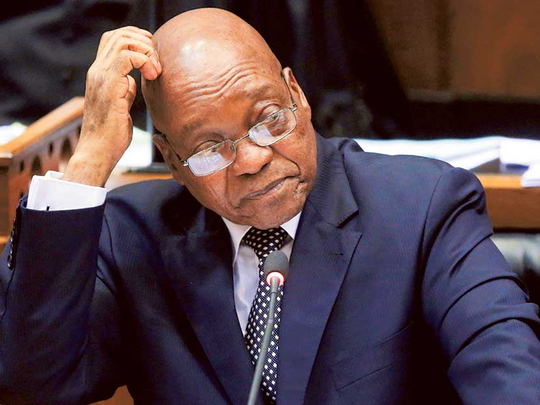
CAPE TOWN: It was the plea of a man whose time has come — and it will most likely fall on deaf ears.
“Each time when I come here, I am abused by members of your house. Instead of answering questions, I sit here being called a criminal, a thief. If this house is not interested in me answering questions, you must say so,” complained South African President Jacob Zuma after another rough appearance in the country’s National Assembly on Tuesday.
He was speaking to a depleted assembly, after two of the smaller opposition parties — the Economic Freedom Fighters (EFF) and Cope — walked out because they refused to listen to a president they described as a ‘criminal’. Efforts by the governing party, the African National Congress (ANC), to protect their president from the accusations, were effectively ignored by the opposition.
Before leaving the chamber, EFF Leader Julius Malema said: “We will wait outside, we are just going to the loo because we are avoiding this criminal.”
The opposition parties want the National Assembly to take disciplinary action against Zuma after the country’s Constitutional Court found that he failed to follow a directive by the Public Protector to pay part of the cost of improvements to his private homestead by the state, which were deemed to unfairly benefit him and his family.
In what is a victory for the rule of law and accountability in South Africa, Zuma paid the money — R7.8 million (Dh1.99 million) — to the National Treasury this week.
But paying off the loan he said he took to cover the R7.8 million and hurtful names in the National Assembly are the least of Zuma’s problems. More worrying for a man who has been accused of abusing state institutions to protect himself from over 700 charges of corruption, his control of the ANC and the government is unravelling at an alarming rate.
ANC support fell precipitously in local government elections early in August, with the party losing control of South Africa’s key economic metropolises to opposition coalitions. This will severely damage its ability to dispense jobs and patronage among local supporters.
Within the ANC, there is a growing recognition that the allegations of corruption and maladministration that are the hallmark of Zuma and his government may well see it lose its grip on power after South Africa’s general election in 2019. This might not be a problem for Zuma, who cannot stand for another term in office, but for anybody else who wants to keep the party in power, his removal from the leadership of the ANC as soon as possible has become a political necessity. As a result, the different ANC factions that want to succeed him are becoming increasingly restive under his leadership. A grasp to take power from Zuma — who will want to anoint his own successor — cannot be far off.
Zuma has also overreached in his battles to ward off corruption charges and concerns that he has put state resources at the disposal of his friends and family to enrich them. Also in the National Assembly this week, there was a debate on an opposition motion for an inquiry into Zuma’s links to the Gupta family.
The Guptas are an Indian family who migrated to South Africa and now hold citizenship of the country. They built a business empire in South Africa, which includes companies they share with members of the Zuma family. While there has been a myriad of allegations that Zuma has ensured their companies benefit from state enterprises, both sides have denied the claims.
The motion for an inquiry was defeated by the ANC, but the South African Public Protector, among others, continues to investigate undue influence on the president by the Guptas — who have indicated they are giving up their South African business interests. This has led to the perception that Zuma’s financial resources are also being depleted.
Perhaps most damaging to the country is the perception that the “government is at war with itself”, a phrase first used recently by Deputy President Cyril Ramaphosa. As if to prove the point, on Tuesday Zuma contradicted his deputy, saying: “I don’t know of any war within government”.
The president might be the only person in the country who is not talking about the war. The South African Finance Minister, Pravin Gordhan — widely credited with trying to protect the National Treasury and state-owned enterprises from maladministration and corruption — is being very publicly investigated by the police. In many quarters, including among senior ANC leaders, the investigation is seen as a ham-handed attempt to intimidate Gordhan to open the state purse for pet projects and favoured people — after earlier attempts by Zuma to remove him failed in the face of resistance by business leaders, among others.
Gordhan has been instrumental in staving off an investment rating downgrade for South Africa, which would be a heavy blow to a country struggling with stagnant growth and persistently high unemployment and its associated social problems. Given the policy uncertainty, stagnant economic growth and sense of political instability that is engulfing South Africa at present, there is not much hope that South Africa will be able to avoid an investment ratings downgrade when its status is reviewed again, later this year.
Speaking to Gulf News, author and political risk analyst Justice Malala commented: “Zuma is losing his much-vaunted, untrammeled ability to bend Cabinet and the ANC to his will. The battle for control is on.
“South Africa has a strong Constitution, opposition, civil society and judiciary. The economy has proved surprisingly resilient. This will continue to make a simple capture of the state difficult. I foresee a period of intense political noise, but believe that democracy in South Africa can withstand this.”
But Zuma is running out of time to learn that respect is earned, not given.












